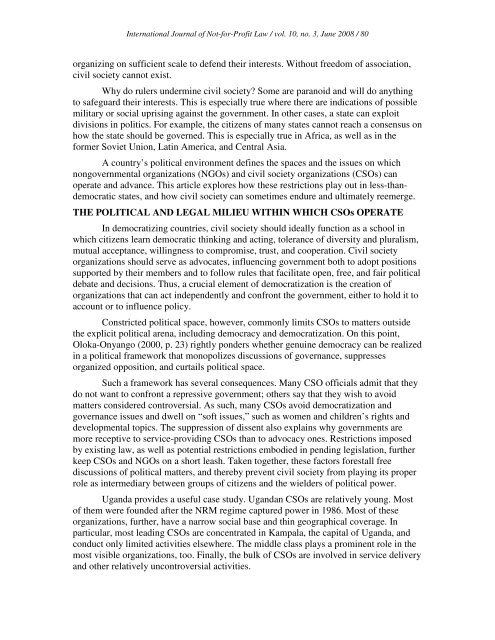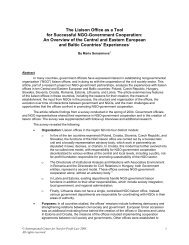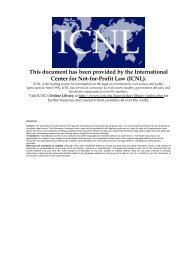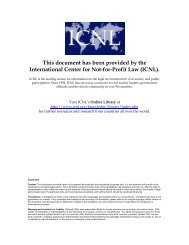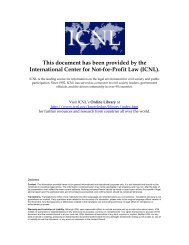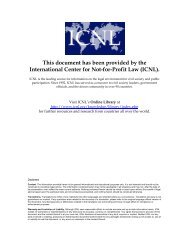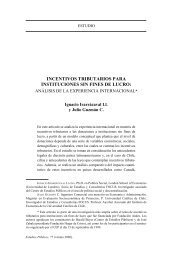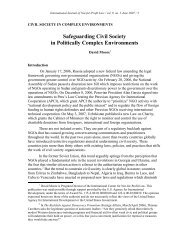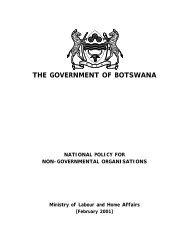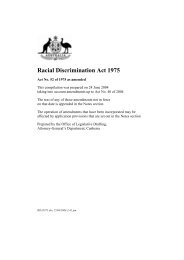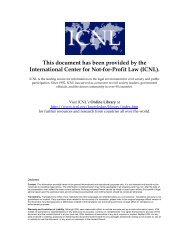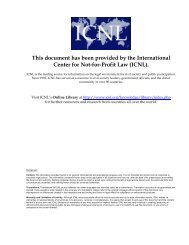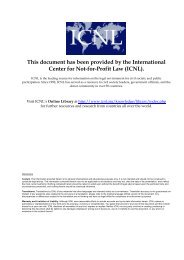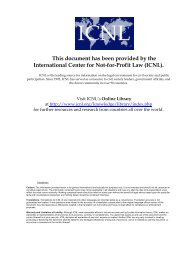Rising from the Ashes: The Rebirth of Civil Society in an ...
Rising from the Ashes: The Rebirth of Civil Society in an ...
Rising from the Ashes: The Rebirth of Civil Society in an ...
Create successful ePaper yourself
Turn your PDF publications into a flip-book with our unique Google optimized e-Paper software.
International Journal <strong>of</strong> Not-for-Pr<strong>of</strong>it Law / vol. 10, no. 3, June 2008 / 80<br />
org<strong>an</strong>iz<strong>in</strong>g on sufficient scale to defend <strong>the</strong>ir <strong>in</strong>terests. Without freedom <strong>of</strong> association,<br />
civil society c<strong>an</strong>not exist.<br />
Why do rulers underm<strong>in</strong>e civil society Some are par<strong>an</strong>oid <strong>an</strong>d will do <strong>an</strong>yth<strong>in</strong>g<br />
to safeguard <strong>the</strong>ir <strong>in</strong>terests. This is especially true where <strong>the</strong>re are <strong>in</strong>dications <strong>of</strong> possible<br />
military or social upris<strong>in</strong>g aga<strong>in</strong>st <strong>the</strong> government. In o<strong>the</strong>r cases, a state c<strong>an</strong> exploit<br />
divisions <strong>in</strong> politics. For example, <strong>the</strong> citizens <strong>of</strong> m<strong>an</strong>y states c<strong>an</strong>not reach a consensus on<br />
how <strong>the</strong> state should be governed. This is especially true <strong>in</strong> Africa, as well as <strong>in</strong> <strong>the</strong><br />
former Soviet Union, Lat<strong>in</strong> America, <strong>an</strong>d Central Asia.<br />
A country’s political environment def<strong>in</strong>es <strong>the</strong> spaces <strong>an</strong>d <strong>the</strong> issues on which<br />
nongovernmental org<strong>an</strong>izations (NGOs) <strong>an</strong>d civil society org<strong>an</strong>izations (CSOs) c<strong>an</strong><br />
operate <strong>an</strong>d adv<strong>an</strong>ce. This article explores how <strong>the</strong>se restrictions play out <strong>in</strong> less-th<strong>an</strong>democratic<br />
states, <strong>an</strong>d how civil society c<strong>an</strong> sometimes endure <strong>an</strong>d ultimately reemerge.<br />
THE POLITICAL AND LEGAL MILIEU WITHIN WHICH CSOs OPERATE<br />
In democratiz<strong>in</strong>g countries, civil society should ideally function as a school <strong>in</strong><br />
which citizens learn democratic th<strong>in</strong>k<strong>in</strong>g <strong>an</strong>d act<strong>in</strong>g, toler<strong>an</strong>ce <strong>of</strong> diversity <strong>an</strong>d pluralism,<br />
mutual accept<strong>an</strong>ce, will<strong>in</strong>gness to compromise, trust, <strong>an</strong>d cooperation. <strong>Civil</strong> society<br />
org<strong>an</strong>izations should serve as advocates, <strong>in</strong>fluenc<strong>in</strong>g government both to adopt positions<br />
supported by <strong>the</strong>ir members <strong>an</strong>d to follow rules that facilitate open, free, <strong>an</strong>d fair political<br />
debate <strong>an</strong>d decisions. Thus, a crucial element <strong>of</strong> democratization is <strong>the</strong> creation <strong>of</strong><br />
org<strong>an</strong>izations that c<strong>an</strong> act <strong>in</strong>dependently <strong>an</strong>d confront <strong>the</strong> government, ei<strong>the</strong>r to hold it to<br />
account or to <strong>in</strong>fluence policy.<br />
Constricted political space, however, commonly limits CSOs to matters outside<br />
<strong>the</strong> explicit political arena, <strong>in</strong>clud<strong>in</strong>g democracy <strong>an</strong>d democratization. On this po<strong>in</strong>t,<br />
Oloka-Ony<strong>an</strong>go (2000, p. 23) rightly ponders whe<strong>the</strong>r genu<strong>in</strong>e democracy c<strong>an</strong> be realized<br />
<strong>in</strong> a political framework that monopolizes discussions <strong>of</strong> govern<strong>an</strong>ce, suppresses<br />
org<strong>an</strong>ized opposition, <strong>an</strong>d curtails political space.<br />
Such a framework has several consequences. M<strong>an</strong>y CSO <strong>of</strong>ficials admit that <strong>the</strong>y<br />
do not w<strong>an</strong>t to confront a repressive government; o<strong>the</strong>rs say that <strong>the</strong>y wish to avoid<br />
matters considered controversial. As such, m<strong>an</strong>y CSOs avoid democratization <strong>an</strong>d<br />
govern<strong>an</strong>ce issues <strong>an</strong>d dwell on “s<strong>of</strong>t issues,” such as women <strong>an</strong>d children’s rights <strong>an</strong>d<br />
developmental topics. <strong>The</strong> suppression <strong>of</strong> dissent also expla<strong>in</strong>s why governments are<br />
more receptive to service-provid<strong>in</strong>g CSOs th<strong>an</strong> to advocacy ones. Restrictions imposed<br />
by exist<strong>in</strong>g law, as well as potential restrictions embodied <strong>in</strong> pend<strong>in</strong>g legislation, fur<strong>the</strong>r<br />
keep CSOs <strong>an</strong>d NGOs on a short leash. Taken toge<strong>the</strong>r, <strong>the</strong>se factors forestall free<br />
discussions <strong>of</strong> political matters, <strong>an</strong>d <strong>the</strong>reby prevent civil society <strong>from</strong> play<strong>in</strong>g its proper<br />
role as <strong>in</strong>termediary between groups <strong>of</strong> citizens <strong>an</strong>d <strong>the</strong> wielders <strong>of</strong> political power.<br />
Ug<strong>an</strong>da provides a useful case study. Ug<strong>an</strong>d<strong>an</strong> CSOs are relatively young. Most<br />
<strong>of</strong> <strong>the</strong>m were founded after <strong>the</strong> NRM regime captured power <strong>in</strong> 1986. Most <strong>of</strong> <strong>the</strong>se<br />
org<strong>an</strong>izations, fur<strong>the</strong>r, have a narrow social base <strong>an</strong>d th<strong>in</strong> geographical coverage. In<br />
particular, most lead<strong>in</strong>g CSOs are concentrated <strong>in</strong> Kampala, <strong>the</strong> capital <strong>of</strong> Ug<strong>an</strong>da, <strong>an</strong>d<br />
conduct only limited activities elsewhere. <strong>The</strong> middle class plays a prom<strong>in</strong>ent role <strong>in</strong> <strong>the</strong><br />
most visible org<strong>an</strong>izations, too. F<strong>in</strong>ally, <strong>the</strong> bulk <strong>of</strong> CSOs are <strong>in</strong>volved <strong>in</strong> service delivery<br />
<strong>an</strong>d o<strong>the</strong>r relatively uncontroversial activities.


